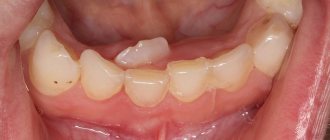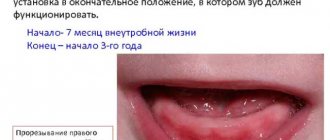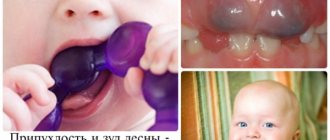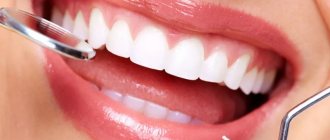26.11.2019
If you're wondering whether teething can cause your baby to sleep poorly, our answer is, of course, yes. From this article you will learn how to recognize the first signs of teething, what remedies will help facilitate the eruption of the very first tooth in a baby and prevent sleep disturbances during teething.
Unfortunately, many people underestimate teething as a cause of child sleep disturbance. Everyone knows that during painful teething, a child’s sleep is often disrupted, because the baby is uncomfortable. But have you ever thought that teething could be the main reason for sleepless nights? Or that it is precisely because of teething that the baby cannot calm down and fall asleep on his own?
For some babies (and their parents!), the eruption of baby teeth occurs almost imperceptibly. Salivation increases slightly - and suddenly a tooth appears! But for many children, the eruption of baby teeth is accompanied by pain. In addition, constant pressure inside the gums bothers and irritates the baby. Due to discomfort, the child may lose appetite.
So, directly or indirectly, teething affects the baby's night sleep. During the day, it is easier for a baby to be distracted and calm down in the arms of his parents, but at night the discomfort is felt much more strongly. And the discomfort and pain that accompany teething usually means that no one in the family will sleep at night.
What to do if teeth do not erupt “on time”?
Nothing to do. As stated earlier, the timing is quite relative and not strict data. There is such a thing as the individual characteristics of a child. Plus neonatal indicators, physical constitution, etc. Thus, the timing of the appearance of teeth in your child is normal for him. The same applies to permanent teeth.
The later the teeth appear, the healthier they will be?
Is not a fact. The timing of teething does not affect their “quality”.
What sedatives can be used during teething? Do they influence the process itself?
No, such drugs do not affect the process of teeth formation and, as a rule, have no side effects. For children with allergies, there is a sedative called Doctor Baby that does not contain lidocaine. Almost all gels contain lidocaine and inert fillers (cooling menthol, astringents and flavoring additives). You can use Dentinox, Kalgel (be careful with diathesis, because it is sweet), Kamistad (very effective, but you need to know when to stop), Mundizal, Cholisal, Solcoseryl dental paste (especially good in the presence of wounds or ulcers).
How often should such drugs be used?
Soothing gels are not antibiotics and do not need to be used according to a specific regimen. If the child is in pain, apply it, but if everything is calm, don’t. But it’s better not to use it more than 3-4 times a day and for longer than 3 days in a row.
Features of children's sleep
The structure of children's sleep differs from that of adults. For example, in the first months of life, REM sleep accounts for more than half of its total duration. A baby's sleep begins with the "rapid" sleep phase, while in an adult it begins with the "slow" sleep phase. The distribution of time will also vary: for example, in newborns, the total sleep time is distributed equally between day and night; by one year of life, night sleep becomes predominant; by the age of 4, most children no longer feel the need for daytime sleep. [2]
According to official statistics, on average, each newborn spends about 18 hours a day sleeping. If a newborn baby does not sleep well, this can have a detrimental effect on his health and behavior. In the first half of the year, for good health, the baby needs at least 14 hours of sleep per day, however, the normal duration can vary from 11.4 to 16.5 hours. Gradually, the need for sleep in infants decreases, which is associated with the development of the nervous system, and a child aged 4 years needs about 12 hours of rest per day.
Ensuring quality and regular sleep is very important for the life and further development of the baby. The release of the so-called growth hormone - melatonin - occurs in children mainly in the stage of deep sleep; processing information and entering it into memory occurs in a dream - which is important in the first months of a person’s life. [3]
Is it possible to speed up teething?
Medication - no. But massaging your gums won't hurt at all. Using a clean finger, gently and gently massage your baby's gums. The baby will feel better, and the tooth will cut through faster. Just do not press hard so as not to injure the gums. You can give your child a cool spoon or pacifier to hold in his mouth. Try buying special teethers with liquid. They are placed in the refrigerator for a while, and then given to the child to chew on. All these methods are good in moderation, do not overdo it.
Can bad breath occur during teething and what is the cause?
The process of teething is associated with partial decomposition (lysis) of the mucous membrane under the action of salivary enzymes. We all notice that the amount of saliva increases sharply during this period. In this case, indeed, indicators such as viscosity, color and smell of saliva may change. Another factor is the presence of weak antibacterial substances in saliva, which are designed to prevent infection of the wound when a tooth cuts through the gum. A certain amount of blood also enters the oral cavity. When it decomposes, a sour (metallic) odor may appear.
A sharp increase in temperature during teething. What to do?
Teething does not cause a temperature jump to 39-40 degrees. Only a slight increase is possible, which is normal. Be careful: teething should not cause high fever, diarrhea, vomiting, complete loss of appetite, cramps or choking. If you have such symptoms, even if you attribute it to your teeth, consult a doctor. It is also not recommended to use antipyretics and painkillers without consulting him.
What is the difference between an increase in temperature due to teething and an increase due to other reasons? How long can the elevated temperature last in the first case?
It all depends on the individual characteristics of the child. Basically, hyperthermia and diarrhea are only secondary signs of the teething process, which in itself is a serious physiological turning point for a small organism. Fever is, rather, a reaction to inflammation of the oral mucosa. After all, at the site where the tooth exits, irritation forms, often a wound that can become infected. Thus, hyperthermia is caused not by the mechanism of tooth formation itself, but by side effects. After all, the eruption of permanent teeth, despite the similarity of histological and physiological changes, causes symptoms of colds and diarrhea extremely rarely. And it is quite simple to explain their appearance in children: changes in diet and diet, constant foreign objects in the mouth, microflora disturbance, weakened immunity in the nasopharynx. So, if high fever and loose stools continue for more than 72 hours, then teething really has nothing to do with it.
What to do if you have tooth pain at night
It is necessary to assume that at night the pain becomes much stronger than during the day. Physiologically, a person should already be resting, but he has to look for a way to alleviate his condition. The worst case scenario is when acute pain causes you to wake up.
In such situations, all thoughts are aimed at eliminating unpleasant sensations as soon as possible. It is unlikely that someone will prepare a complex decoction or tincture in the middle of the night.
We offer several quick solutions to help relieve the pain at least a little:
- Immediately take an analgesic - any one you have in the house. The group includes analgin, tempalgin, pentalgin, ketorol. Paracetamol will help. Be aware of the danger of overdose. Medicines begin to act approximately 20-30 minutes after administration.
- Apply something cold to your cheek. Take ice or a piece of meat out of the freezer; even a pack of dumplings will do. Wrap it in a towel and apply it to the sore cheek. The cold will help relieve swelling from the tissues, and the pressure on the nerve roots will decrease. It is important to remember that you need to take breaks every 15-20 minutes so as not to chill the trigeminal nerve.
- Rinse your mouth with a warm solution of baking soda - one teaspoon per glass of water. Repeat rinsing every half hour. It will not be possible to completely remove the pain, but it will become a little easier.
- Brew any herb that has anti-inflammatory properties - chamomile, thyme, oregano. Standard proportions are one tablespoon per glass of boiling water. Infuse, cool, strain. Rinse only with warm solution.
- Use folk remedies - apply a piece of lard to the sore gum, a clove of garlic to the wrist. If you have it in the house, you can rinse your mouth with vodka or cognac (do not drink, this is important) - at first you will feel a sharp pain, then it will become easier.
If you are tired and can no longer walk, lie down in a semi-sitting position. In this case, the head must be higher than the body.
To distract yourself, you can do some quiet work - ironing clothes, drawing, embroidering, writing notes. The main thing is that you can switch your attention.
You will need to survive the most difficult time - from midnight to five o'clock in the morning. In the morning, the production of corticosteroids will begin to increase, and the pain will subside a little. We recommend that you prepare for a visit to the doctor once. No one else will help you.
Do not ignore preventive visits to the dentist.
It is enough to visit a specialist 1 – 2 times a year, which will allow you to promptly identify any dental problem at an early stage of development. This means that its elimination will be quick, easy and without complications.
By clicking the “request a call” button you agree to the personal data processing policy.
Teething in infants
Possible characteristics of teeth in children at the teething stage. Stay up to date.
The expansion of the spaces between the teeth is caused by the growth of the jaws. During the transition from baby teeth to permanent teeth, it is considered a normal condition. A wide gap between the upper anterior incisors is usually associated with a deep-lying maxillary frenulum. An orthodontist should observe and treat such a gap between the teeth;
- a blackish edging on the neck of the tooth can form when taking soluble iron supplements, as well as during a chronic inflammatory process (precipitation of bacteria from the leptotrichium group);
- yellowish-brown staining of teeth may be associated with the use of antibiotics - by the mother in the 2nd half of pregnancy or by the child himself during the formation of teeth;
- yellowish-greenish coloring is caused by severe disturbances in bilirubin metabolism, hemolytic conditions (destruction of red blood cells);
- reddish staining of tooth enamel is characteristic of a disease called porphyria - a congenital disorder of the metabolism of porphyrin pigment;
- malocclusions are formed by the uneven growth of the child’s jaws, as well as prolonged sucking of the nipples;
- Anomalies in the location of teeth occur for a number of reasons: trauma, congenital disorders of connective tissue metabolism, constitutional reasons (small jaw size), tumors of the alveolar process of the jaw.
- the absence of teeth before one year of age is extremely rarely associated with edentia (lack of tooth buds), which can be checked using radiovisiography as prescribed by a pediatric dentist.
If teeth erupt on time and in a certain order, this indicates the normal development of the child’s body. After all, this physiological process is in direct connection with the general health of the baby. Some atypical cases may indirectly indicate the presence of pathology. But only a special examination of the child can confirm or refute the assumptions made. The reasons must be identified and analyzed by a specialist.
Psycho-emotional discomfort
The first factor from this group is significant changes in the child’s life: moving, joining the family, starting “kindergarten” life. The child is worried, worried and sleeps poorly.
How to proceed:
- don't scold;
- devote enough time during the day;
- discuss the baby’s feelings and emotions;
- gently soothe;
- pay attention to the positive aspects of change.
The second factor is stress: a quarrel with a friend, a fight with a peer, scandals in the family, divorce of parents. The baby replays the situation in his head over and over again, blames himself for everything, and sleeps little and restlessly.
How to proceed:
- talk to your child more often, tell him that you love him;
- consider the problem from different angles;
- explain the actions of other people;
- Do not allow the baby to be present when adults quarrel.
The third factor is fears. They are varied, occur in children at the age of 2-3 and can disturb a child’s sleep for a long time, preventing him from falling asleep, and then exhausting him with nightmares.
How to proceed:
- if fears arise in a 2-year-old child due to the cancellation of co-sleeping with his mother, extend this period a little;
- create calming bedtime rituals - a warm, relaxing bath, a good bedtime story from dad or a lullaby from mom;
- get an object intermediary - a teddy bear or a bunny that you can hug in your sleep and no longer be afraid of;
- do not insist on complete darkness - turn on a small night light.
The fourth factor is congenital increased excitability. Such children are anxious, restless, and have difficulty parting with their mother.
How to proceed:
- if possible, organize co-sleeping in the first year or two of life;
- do not scold or shame;
- before going to bed, prefer very quiet activities and have a relaxing massage;
- when waking up at night, make him feel that the baby is safe - pat him on the arm or back, calm him down in a quiet voice.










